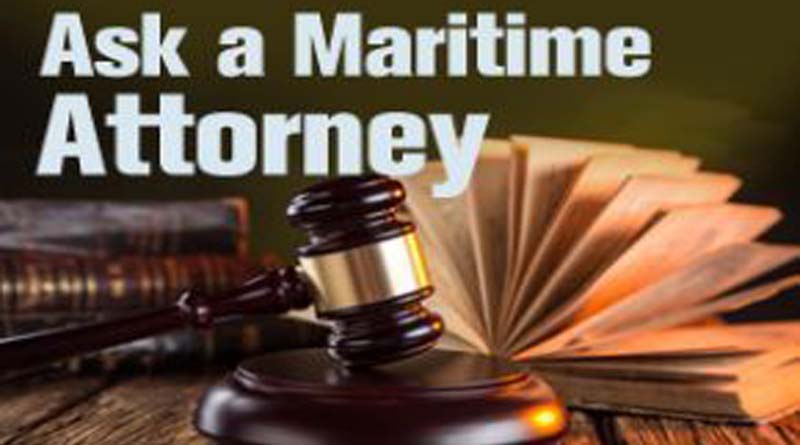Ask a Maritime Attorney: Can a Commercial Vessel Charter Guest Recreationally?
Question:
I am interested in using my 46 ft. sailing yacht in a charter business to offset some of the costs of ownership. I am familiar with the chartering clubs that allow customers to take the boat out on their own, but I have a captain’s license and I am interested in taking out passengers for wine cruises and for overnight trips to Catalina. What legal issues should I be concerned about before I get started?
Answer
A new charter business will need to address a long list of issues ranging from city permits and marina restrictions to passenger parking, liquor licenses, and a hundred other details. But the important legal issues can probably be divided into three categories: The boat, the operator, and the insurance.
The first question concerning the boat is whether a Coast Guard inspection will be required. If the boat is under 100 gross tons, it may carry up to six paying passengers (a “six-pack” charter) without the need for a Coast Guard inspection.
A Coast Guard inspection relating to the carriage of passengers for hire should not be confused with the courtesy inspections conducted by the Coast Guard Auxiliary. A Coast Guard inspection for a boat in passenger service is much more rigorous and much more expensive. The inspector will examine the structural design and construction of the vessel and all of the vessel’s systems, and initial inspections are conducted while the boat is out of the water. Most inspected boats are built to Coast Guard specifications when the boat is new, since the reconstruction of an older boat to these standards is usually prohibitively expensive.
While we’re considering the characteristics of the proposed charter boat we also need to look at where the boat was built. The United States is one of many nations that protects its domestic transportation industries through “cabotage” laws. These laws require the transportation of passengers or cargo between U.S. ports to be performed aboard boats that are registered and built in the United States.
Cabotage laws apply regardless of how many passengers are being carried aboard the boat, which may be a problem since many sailing yachts in the size range of our reader’s boat are foreign-built. A foreign built vessel may not legally carry passengers for hire in this country unless the owner obtains a waiver of the restriction through to the Small Vessel Waiver Program administered by the United States Maritime Administration (“MARAD”). Information regarding a waiver is available on MARAD’s web site at https://www.marad.dot.gov (follow the links to the Small Vessel Waiver Program).
The next issue involves the operator of the vessel. The master of any vessel that carries passengers for hire must be licensed by the Coast Guard as a captain, for the class of service in which the boat is operating. Our reader apparently holds a Coast Guard license, but since he is interested in operating overnight charters, the Coast Guard may require an additional licensed crew person to be aboard if the vessel is away from a dock for extended periods, even if the boat is anchored at night.
Next, our reader will need to consider the boat’s insurance policy and other forms of liability protection, and for that he will need to talk to his marine insurance broker about a charter policy. At a minimum, the policy must include an endorsement for the commercial operation of the vessel (most marine insurance policies exclude coverage for these operations), coverage for claims made by passengers, and “Jones Act” coverage for claims made by paid members of the crew.
The specific requirements for a charter operation will vary from boat to boat and from harbor to harbor. Anyone interested in getting it “right” the first time (rather than waiting for the Coast Guard to respond after an accident) should contact the Coast Guard’s local Marine Safety Office AND a maritime attorney familiar with charter businesses.
David Weil is licensed to practice law in the state of California and as such, some of the information provided in this column may not be applicable in a jurisdiction outside of California. Please note also that no two legal situations are alike, and it is impossible to provide accurate legal advice without knowing all the facts of a particular situation. Therefore, the information provided in this column should not be regarded as individual legal advice, and readers should not act upon this information without seeking the opinion of an attorney in their home state.
David Weil is the managing attorney at Weil & Associates (www.weilmaritime.com) in Seal Beach. He is certified as a Specialist in Admiralty and Maritime Law by the State Bar of California Board of Legal Specialization and a “Proctor in Admiralty” Member of the Maritime Law Association of the United States, an adjunct professor of Admiralty Law, and former legal counsel to the California Yacht Brokers Association. If you have a maritime law question for Weil, he can be contacted at 562-799-5508, through his website at www.weilmaritime.com, or via email at dweil@weilmaritime.com.


